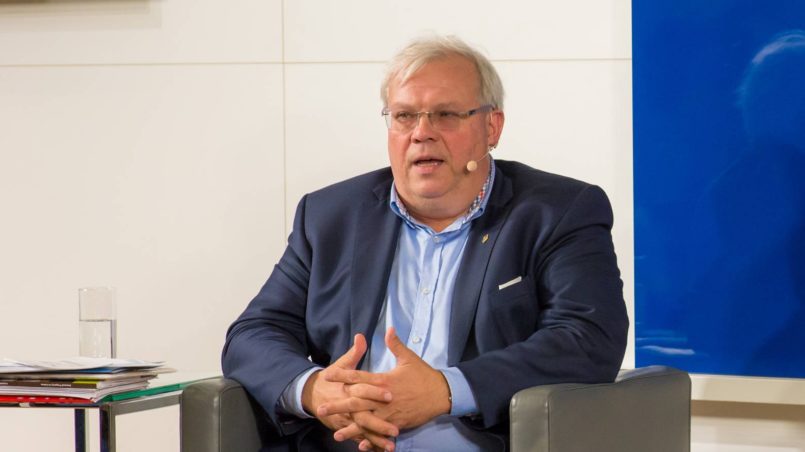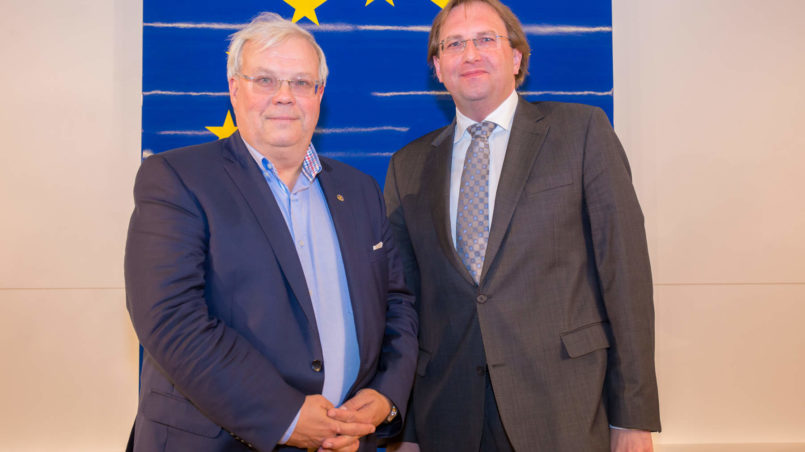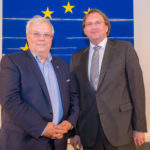Mag. Christian Wehrschütz on the Role of the Balkans in the EU

Event data
- Datum
- 16. 10. 2016
- Host
- Europa:DIALOG
- Location
- Haus der Europäischen Union, Wipplingerstraße 35, 1010 Wien
- Event-type
- Dialog
- Participants
- Mag. Christian Wehrschütz, ORF-Korrespondent, Balkan-Experte
- Benedikt Weingartner, Moderator
In the Europa DIALOG discussion on 16th October 2016 in the Haus der Europäischen Union with the ORF correspondent, Mag. Christian Wehrschütz, the focus was the situation in the Ukraine. According to the expert, the situation in the Balkan region appears similarly complicated. The interview now continues with a focus on the role of the Balkans in the European Union.
Moderator: Benedikt Weingartner
As a correspondent you are responsible for many of the successor states of the former Yugoslavia and Albania? How is the topic of “refugee routes” – and, above all, their closure – currently received there?
According to Wehrschütz, all countries which lie on the migration/Balkan route are generally happy to help. But:
People are afraid that all the refugees will stay.
The approaches to this topic vary from country to country:
Serbia, due to its foreign policy, which is heavily oriented to Angela Merkel, has done all it can to comply with the German policy. Aleksandar Vučić – following in the steps of Zoran Đinđić – has revived the “German axis”. One wanted to avoid negative images reminiscent of the war with police or tear gas; today Serbia is lucky that the younger generation no longer connect their homeland with Radovan Karadžić or Slobodan Milošević but rather with Novak Đoković.
Macedonia still had negative experiences with refugee movements from the war in Kosovo. At that time, hundreds of thousands suddenly came from Albania and the country had enormous problems in looking after these masses.
According to Wehrschütz, prior to the wave of migration and refugees, the Serbs, the Kosovo-Albanians and actually everyone was informed:
So you are sending us all the migrants who want to work illegally here.
For example, one can recall the story of Arigona Zogaj. And suddenly Ivica Dačić appeared in his role as Serbian Foreign Minister and stated: “You are destabilising our Balkan states: the wave of migrants and refugees comes from the EU state, Greece, into the non-EU states. We have to pass this on.”
The foreign reporter considers as absurd the situation that a state like Macedonia – which was blocked by the EU Member State, Greece, for ten years as regards EU accession negotiations – suddenly had to take on the protection of the EU external border because this was not possible in Greece:
Time and again, the demand for a unitary European refugee policy was raised but the whole world knew that this would not happen.
In Serbia there are currently 7,000 people, some of whom came from Greece and who want to move on. Further there is a new route via Bulgaria where also 7,000 people are stationed.
However, Serbia will do all it can to prevent these people from having to spend winter in Serbia. Wehrschütz sees the tourist trade which has developed as absurd:
The Germans are sending people back – to date around 12,000 people. We send them on to the Croatians and the Croatians, for their part, send them on further.
Sebastian Kurz is for a closure of the Balkon routes. Angela Merkel states that this would be a grave error. What does Christian Wehrschütz say?
In 2010 a leading American scientist wrote a book: ‘The Weapon of Mass Migration’. Migration and the migration policy of states has always ben a political weapon. Yuu only have ot think of the boat people, of Haiti, of Vietnam.
The main problem is actually less the question of whether the Balkan route should now be open or closed but more the figures. Worldwide there are approximately one billion migrants, one quarter of whom are not in their homelands.
Therefore, we are dealing with a migration of peoples of unknown proportions. If we are not in a position to solve these problems at their roots, we will not be able to overcome this.
How aggressive are the traffickers? From the Mediterranean region there is talk that they are at times very aggressive towards journalists…
Wehrschütz has always witnessed the extent to which trafficking organisations, partly also NGOs, have been involved. He was in northern Greece and was filming a regugee camp there when a group of youths appeared with slogans such as “We want Germany!” and “Open the border!”.
It cannot be the task of a journalist to allow oneself to be manipulated by trafficking organisations.
25 years have passed since war waged in the former Yugoslavia. You report from the successor states: Slovenia was the first state to join the EU in 2004, Croatia in 2013. A rapprochement to Europe is occurring. What is the situation of these Balkan states in relation to the European Union?
The further away from paradise, the prettier it appears. The countries which have the highest rate of approval for accession to the EU are, as a rule, those countries which are furthest away, for example, Albania and Kosovo. There is a clear approval rate in Montenegro but Serbia is a special case.
In Serbia, on the one hand, the very strong pro-Russia propoganda plays a role in the yellow press, according to Wehrschütz. But even here, if there were an EU referendum, 45% would currently vote for accession and 33% against according to a serious survey.
The problem is the lengthy transition process: in Serbia Slobodan Milošević was overthrown on 25th October 2000; Macedonia has had “candidate status” for ten years, Bosnia has now at least accepted the accession application.
The people are not aware of how important the EU is for modernisation. In general, in these countries, the European perspective plays a minor role because it is so far away.
If I had said to you, as I did to my daughter who is now an adult: ‘Listen, if you are good, I will raise your pocket money in ten years‘, this would certainly not have been a great motivation for you.
Serbia received 2,000 billion Euro from the EU or from European countries. Was this not felt by the population?
Yes, but there is no connection made to the EU. The safe power supply, the modernisation of power plants – all of this was financed by the EU. But of course no Serbian politician has an interest in proclaiming this truth. Furthermore, the EU follows the creed:
The modernisation of Serbia, the modernisation of the Balkans as a whole only happened because of the EU but this also has to be perceived.
How should the marketing of Europe in the Balkans be shaped?
The EU could, for example, place a large sign on a power plant whose filter installation it financed stating: “Financed with funds from the EU“. The EU has indeed financed really good and useful programmes such as the battle against rabies. A film team could also be hired to record such events and then this material could be placed at the disposal of the Serbian TV broadcasting companies.
Are Slovenia and Croatia not impressive examples for the other states in the Balkans?
Slovenia is of course THE example and the decisive factor, according to Wehrschütz. In terms of accession negotiations, Montenegro is formally at the most advanced stage; but even there 22 of the 35 chapters have been opened but only two concluded.
And the battle with bureaucracy in Croatia revealed that it was not possible to even demand all of the requirements…
The bureaucracy of the EU should not be made responsible for this. Austria, for example, did its best to establish a Chamber of Agriculture in Croatia and this was successful under the conservative government. However, when the social democrats came to power, this Chamber of Agriculture was immediately disempowered with the result that it became very problematic for the individual farmers to handle funding applications.
Here, Croatia itself committed an error. When I know: I have a certain amount of money which I can call on and then I do not do so, then this is of course the main problem of the country itself and and not of the European bureaucracy.
In a nutshell: at the moment Albania, Macedonia, Montenegro and Serbia have candidate status. Montenegro and Serbia are conducting accession negotiations and are already one step further. Potential candidates would be Bosnia-Herzegovina and possibly Kosovo.
Five EU member states have not recognised Kosovo and for this reason the Stabilisation and Association Agreement, for example, was concluded between Kosovo and the EU as an organisation and not between Kosovo and the member states; as such, the problem of ratification by countries which do not recognise Kosovo was overcome.
Money as significant support also flows into these countries. It is said that many chapters have either not yet been opened or that there are no prospects for the two countries which are already negotiating. But where are the core problems precisely? The economy? Corruption?
This varies from country to country. In the case of Serbia, Kosovo is an accomplanying political problem.
But think about what it would mean for agriculture alone to produce all these certificates of origin, to implement all these norms which I have today.
However, it is not only the bureaucracy as regards standards which is the problem – environmental protection and waste disposal are further examples. In the Ukraine, for example, there is no separation of waste while in other states this is only just beginning.
Is the economy in principle on the rise?
In these countries generally the economic situation is good but the high rate of umemployment is still a great problem.
A rule of thumb states that only when I achieve an economic growth greater than 3% in one year will this have an effect on the labour market. This is, for example in Serbia, not the case and also not in the other countries. The true unemployment rate there ranges from 18-20%, but in some other regions it is 10%.
Do the young people have a sense of perspective or rather a feeling of frustration?
In general, the people are deeply rooted in their city, their country. Croatia has experienced a huge loss in terms of people since the opening of the labour market in the EU. 40,000/50,000 young people have emigrated in three/four years. This leads to problems on the labour market, for example in the tourist industry..
Serbia loses approximately 30,000 of its inhabitants every year as a result of emigration and obsolescence – an enormous problem. Also Croatia has a negative population development. Slovenia is somewhat more balanced. And the Ukraine had a population of 52-53 million at the time of independence; now the figure is 43 million which represents an enormous burden for the social system.
What are the destinations which attract the young generation?
The more educated one is, the greater is the trend to go to the USA, Australia or Canada. Skilled workers are attracted to Germany and Austria. It is interesting that no European university has such a good image that a Croatian would think of choosing it as their first destination.
Can you tell us, as an expert, what we should really know about the Balkan countries and their inhabitants.
We should say goodbye to the cliché of the powder keg of the Balkans. (…) The people there, as a rule, have the same craving for a quiet and peaceful life like us but of course a different history with 50 years of communism and the Ottoman Empire.
The people want to live a normal life as in Germany or Austria. They have just as many talented and less talented people as us. They partially speak much better English than many people in Austria.
The Balkans as the former “soft underbelly” of the EU will only be finally stabilised when this region becomes part of the EU. And also that the states become members of NATO. This is what Wehrschütz wishes for for this region.
Stability for these people would mean being able to lead a quiet in safety, then many other things would definitely change. This is also true for the Ukraine. And Mag. Christian Wehrschütz also wishes for this region:
Simply to live in peace as we in Austria have been able to do for decades.
As regards your personal perspective, including that of the Ukraine and the Balkans: What would you wish for from the EU in the future? What has to happen or what do you expect from the countries?
I have a mandate until the end of 2020. I wish that my seven-month-old granddaughter will hear much from the countries in which I work. And from the European Union, I hope that it can grow into a peaceful, unified and strong Europe which I can accompany on its path as long as possible.
Translation German-English: Donna Stockenhuber



